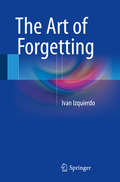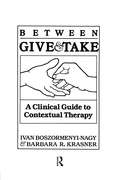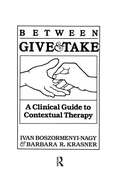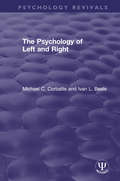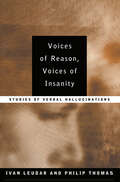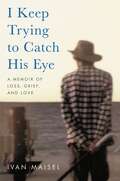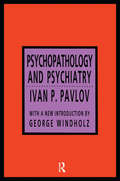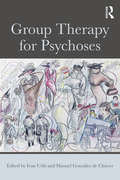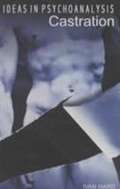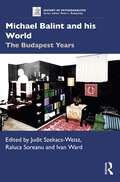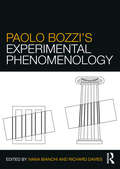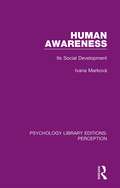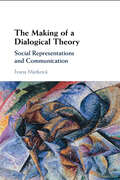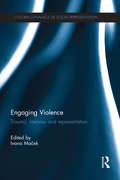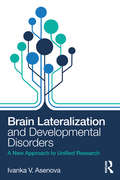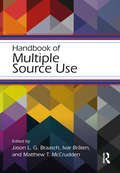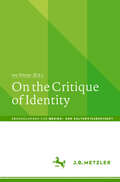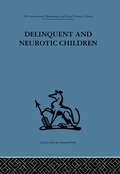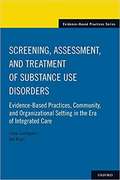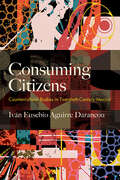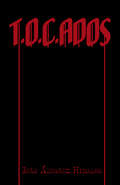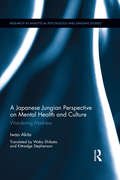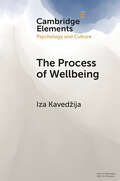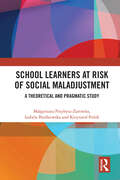- Table View
- List View
The Art of Forgetting
by Ivan IzquierdoHow do we forget? Why do we need to forget? This book intends to answer to these and other questions. It aims to demonstrate that each one is who it is due to their own memories. Thus, distinguish between the information we should keep from those we should forget is an difficult art. In this book, the author discusses about the different types of memory, the main types of forgetting (avoidance, extinction and repression), their brain areas and their mechanisms. In this sense, the art of forgetting, or the art of do not saturate our memory mechanisms, is something innate, that benefits us anonymously, keeping us from sinking amidst our own memories. The essays that compose this book go through several aspects, since individuals to societies' memory. By the end of the book, the reader will be able to understand that we forget to be able to think, to live and to survive.
Between Give And Take: A Clinical Guide To Contextual Therapy
by Ivan Krasner Boszormenyi-NagyIn this volume, Boszormenyi-Nagy and Krasner provide a comprehensive, sharply focused guide to the clinical use of Contextual Therapy (CT) as a therapy rooted in the reality of human relationships. The authors describe a far-reaching trust-based approach to individual freedom and interpersonal fairness that makes possible a remarkably effective system of psychotherapy. Between Give and Take clearly delineates four basic dimensions of relational reality: factual predeterminants, human psychology, communications and transactions and due consideration or merited trust. It is this last dimension that is the cornerstone of CT. It builds on the realm of the "between" that reshapes human relationships and liberates each relating person for mature living.
Between Give and Take: A Clinical Guide to Contextual Therapy
by Ivan Krasner Boszormenyi-NagyIn this volume, Boszormenyi-Nagy and Krasner provide a comprehensive, sharply focused guide to the clinical use of Contextual Therapy (CT) as a therapy rooted in the reality of human relationships. The authors describe a far-reaching trust-based approach to individual freedom and interpersonal fairness that makes possible a remarkably effective system of psychotherapy. Between Give and Take clearly delineates four basic dimensions of relational reality: factual predeterminants; human psychology; communications and transactions; and due consideration or merited trust. It is this last dimension that is the cornerstone of CT. It builds on the realm of the "between" that reshapes human relationships and liberates each relating person for mature living. In these pages the therapist will find a cohesive therapeutic approach that can be applied in every clinical setting. The volume examines such essential areas as the basic principles of CT and their implications for therapy; the four dimensions of the therapeutic process; the client-therapist dialogue; overcoming resistances in therapy; and therapeutic methods, illustrated by a detailed case presentation and discussion of contextual work with marriage. Between Give and Take represents the richly detailed integration of the authors' involvement over a collective period of some 40 years with the fundamental nature of effective therapy and prevention. It is addressed to therapists of all schools, modalities, and convictions, and incorporates experience with both psychodynamic individual therapy and systemic-classical family therapy. It is sure to enrich the therapeutic work of every clinician. Book jacket.
The Psychology of Left and Right (Psychology Revivals)
by Michael C. Corballis Ivan L. BealeOriginally published in 1976, this title deals with the problem of how we tell left from right. The authors argue that the ability to tell left from right depends ultimately on a bodily asymmetry, such as preference for one or the other hand, or dominance of one side of the brain. This has implications for child development, reading disability, navigation, art, and culture.
Voices of Reason, Voices of Insanity: Studies of Verbal Hallucinations
by Philip Thomas Ivan LeudarRecords of people experiencing verbal hallucinations or 'hearing voices' can be found throughout history. Voices of Reason, Voices of Insanity examines almost 2,800 years of these reports including Socrates, Schreber and Pierre Janet's "Marcelle", to provide a clear understanding of the experience and how it may have changed over the millenia. Through six cases of historical and contemporary voice hearers, Leudar and Thomas demonstrate how the experience has metamorphosed from being a sign of virtue to a sign of insanity, signalling such illnesses as schizophrenia or dissociation.They argue that the experience is interpreted by the voice hearer according to social categories conveyed through language, and is therefore best studied as a matter of language use. Controversially, they conclude that 'hearing voices' is an ordinary human experience which is unfortunately either mystified or pathologised.Voices of Reason, Voices of Insanity offers a fresh perspective on this enigmatic experience and will be of interest to students, researchers and clinicians alike.
I Keep Trying to Catch His Eye: A Memoir of Loss, Grief, and Love
by Ivan MaiselIn this deeply emotional memoir, a longtime ESPN writer reflects on the suicide of his son Max and delves into how their complicated relationship led him to see grief as love.In February 2015, Ivan Maisel received a call that would alter his life forever: his son Max's car had been found abandoned in a parking next to Lake Ontario. Two months later, Max's body would be found in the lake. There&’d been no note or obvious indication that Max wanted to harm himself; he&’d signed up for a year-long subscription to a dating service; he&’d spent the day he disappeared doing photography work for school. And this uncertainty became part of his father&’s grief. I Keep Trying to Catch His Eye explores with grace, depth, and refinement the tragically transformative reality of losing a child. But it also tells the deeply human and deeply empathetic story of a father&’s relationship with his son, of its complications, and of Max and Ivan&’s struggle—as is the case for so many parents and their children—to connect.I Keep Trying to Catch His Eye is a stunning, poignant exploration of the father and son relationship, of how our tendency to overlook men&’s mental health can have devastating consequences, and how ultimately letting those who grieve do so openly and freely can lead to greater healing.
Psychopathology and Psychiatry
by Ivan P. PavlovPavlov’s fundamental theory of higher nervous activity concerns the adaptation to changing external environments of organisms such as dogs, apes, and humans. In the 1920s, Pavlov and his disciples used laboratory experimentation to study the etiology and therapy of neuroses In human beings and other species. Later, In the 1930s, Pavlov devoted much time and effort to the systematic study of psychopathology In clinical settings. Psychopathology and Psychiatry is Pavlov’s little-known series of descriptions of these experiments and findings. Pavlov used two fundamental approaches In the study of neuroses and psychoses: the conditioned salivary reflex method, with dogs as subjects; and the observation of neurotic and psychotic behavior In humans. Pavlov was primarily Interested In how the cortex worked to facilitate the orgaftilsm's adaptation to the external environment. The conditioned reflex findings were explained In terms of hypothetical physiological processes. Pavlov was certain that dogs’ Inability to adapt flexibly was the result of conflicts and traumatic experiences. Soon thereafter, he linked these discoveries to actual human cases of neuroses and psychoses. These are covered In this volume. In a new introduction to this classic text, George Windholz traces Pavlov’s scholarly and scientific life, highlighting his various studies and results under stressful political and pedagogical conditions. Psychopathology and Psychiatry continues to be a highly significant work of scientific study. Psychologists, psychiatrists, and behavioral researchers of all professional persuasions will find this work to be essential reading.
Group Therapy for Psychoses
by Ivan Urlić Manuel Gonzalez De ChavezGroup therapy for patients with psychotic experiences is one of the least known of the group therapies; it is also one of the most diverse. This collection presents a range of methods, models and settings for group therapy for psychoses, as well as exploring the context for this type of treatment. Group Therapy for Psychoses offers an international perspective on the current range of practice in the field, in multiple care situations, contexts and institutions; from acute units to therapeutic communities, rehabilitation groups, self-help, and groups of those who hear voices. Presented in two parts, the first covers the history, evaluation and research methodologies of group therapy, while the second explores specific examples of groups and settings. The book tackles misconceptions about the treatment of psychoses and emphasises the healing effects of group therapy. It underscores the importance of training for selecting and conducting groups of patients suffering from psychoses and suggests possible formats, approaches and perspectives. The book’s wide, reflexive and practical collection of chapters together demonstrate how group therapies can effectively help patients with psychotic experiences to overcome their difficulties on their way to recovery. The book will be of great use to clinicians working with people suffering from psychosis, including psychiatrists, psychotherapists, psychoanalysts, psychologists, physicians and social workers. It will also appeal to group analysts, family therapists and CBT practitioners, as well as to all researchers in these fields.
Castration: Ideas in Psychoanalysis
by Ivan WardFrom fashion to football, in our dreams and epiphanies, through jealous rages and moments of genius, the effects of castration anxiety, so claims Ivan Ward, are ever-present. Freud's famous 'castration complex' is met with continually in analytic experience. Yet it seems an unbelievable idea. Taking his evidence from myth, clinical practice and the sexual theories of children, Freud established the castration complex as one of the determining factors of human sexual desire and personality development. Ideas in Psychoanalysis continues to go where no other books dare.
Michael Balint and his World: The Budapest Years (History of Psychoanalysis)
by Ivan Ward Raluca Soreanu Judit Szekacs-WeiszThis fascinating collection explores the life of renowned psychoanalyst Michael Balint in his native Budapest. With a Balint revival in mind, Michael Balint and his World: The Budapest Years brings together the work of psychoanalysts, social thinkers, historians, literary scholars, artists and medical doctors who draw on Balint’s work in a variety of ways. The book focuses on Balint’s early years in Budapest, where he worked with Sándor Ferenczi and a circle of colleagues, capturing the transformations of psychoanalytic thinking as it happens in a network of living relationships. Tracing creative disagreements as well as collaborations, and setting these exchanges in the climate of scientific, social and cultural developments of the time, Michael Balint and his World: The Budapest Years follows the development of psychoanalytic thinking during these critical times. The book recalls the story of several “lost children” of the Budapest School and reconstitutes Balint’s important early contributions on primary love. It also examines his little-known relationship with Lacan, including the extended discussion of Balint’s work by Wladimir Granoff in Lacan’s first public seminar in Paris in 1954, published here for the first time. This important book provides a fresh perspective on Balint’s enormous contribution to the field of psychoanalysis and will interest both scholars and clinicians. It will also inspire those interested in clinical practice and the applications of psychoanalysis to the cultural sphere.
Paolo Bozzi’s Experimental Phenomenology
by Richard Davies Ivana BianchiThis anthology translates eighteen papers by Italian philosopher and experimental psychologist Paolo Bozzi (1930-2003), bringing his distinctive and influential ideas to an English-speaking audience for the first time. The papers cover a range of methodological and experimental questions concerning the phenomenology of perception and their theoretical implications, with each one followed by commentary from leading international experts. In his laboratory work, Bozzi investigated visual and auditory perception, such as our responses to pendular motion and bodies in freefall, afterimages, transparency effects, and grouping effects in dot lattices and among sounds (musical notes). Reflecting on the results of his enquiries against the background of traditional approaches to experimentation in these fields, Bozzi took a unique realist stance that challenges accepted approaches to perception, arguing that experimental phenomenology is neither a science of the perceptual process nor a science of the appearances; it is a science of how things are. The writings collected here offer an important resource for psychologists of perception and philosophers, as well as for researchers in cognitive science.
Human Awareness: Its Social Development (Psychology Library Editions: Perception #19)
by Ivana MarkováHuman awareness – which forms the basis of all interpersonal relationships – is perhaps the most fascinating phenomenon of biological and socio-cultural evolution. In this innovative book, originally published in 1987, the author introduces the subject of human awareness from the perspective of developmental and social psychology. Using a wide range of psychological and other sources, both classic and more recent from around the world, the book begins with a discussion of awareness as a biological and cultural-historical phenomenon. The reader is then guided through such issues as one’s awareness of others, self-awareness, interpersonal communication, and the search of human beings for recognition by others. The final chapter focuses on human awareness as a relationship between the self and society, with particular emphasis on social stability and change. Human Awareness provided the first comprehensive account of human consciousness in a text that reflected the most exciting recent research in the field at the time and emphasized the need for an integrated and coherent understanding of the various psychological disciplines.
The Dialogical Mind: Common Sense and Ethics
by Ivana MarkováDialogue has become a central theoretical concept in human and social sciences as well as in professions such as education, health, and psychotherapy. This 'dialogical turn' emphasises the importance of social relations and interaction to our behaviour and how we make sense of the world; hence the dialogical mind is the mind in interaction with others - with individuals, groups, institutions, and cultures in historical perspectives. Through a combination of rigorous theoretical work and empirical investigation, Marková presents an ethics of dialogicality as an alternative to the narrow perspective of individualism and cognitivism that has traditionally dominated the field of social psychology. The dialogical perspective, which focuses on interdependencies among the Self and Others, offers a powerful theoretical basis to comprehend, analyse, and discuss complex social issues. Marková considers the implications of dialogical epistemology both in daily life and in professional practices involving problems of communication, care, and therapy. Proposes dialogicality as the epistemology of common sense. Highlights the ethical nature of the Self-Other(s) interdependence in its cultural and historical contexts. Emphasises the importance of dialogical epistemology for professional practices.
The Making of a Dialogical Theory: Social Representations and Communication
by Ivana MarkováCreating a stimulating social theory with long-lasting influence for generations of scholars is driven by multiple interacting factors. The fortune of a theory is determined not only by the author's creative mind but also by the ways in which principal concepts are understood and interpreted. The proper understanding of a social theory requires a good grasp of major historical, political, and cultural challenges that contribute to its making. Considering these issues, Marková explores Serge Moscovici's theory of social representations and communication as a case study in the making of a dialogical social theory. She analyses both the undeveloped features and the forward-moving, inspirational highlights of the theory and presents them as a resource for linking issues and problems from diverse domains and disciplines. This dialogical approach has the potential to advance the dyad Self–Other as an irreducible intellectual, ethical, and aesthetic unit in epistemologies of the human and social sciences.
Engaging Violence: Trauma, memory and representation (Cultural Dynamics of Social Representation)
by Ivana MačekThis volume opens up new ground in the field of social representations research by focusing on contexts involving mass violence, rather than on relatively stable societies. Representations of violence are not only symbolic, but in the first place affective and bodily, especially when it comes to traumatic experiences. Exploring the responses of researchers, educators, students and practitioners to long-term engagement with this emotionally demanding material, the book considers how empathic knowledge can make working in this field more bearable and deepen our understanding of the Holocaust, genocide, war, and mass political violence. Bringing together international contributors from a range of disciplines including anthropology, clinical psychology, history, history of ideas, religious studies, social psychology, and sociology, the book explores how scholars, students, and professionals engaged with violence deal with the inevitable emotional stresses and vicarious trauma they experience. Each chapter draws on personal histories, and many suggest new theoretical and methodological concepts to investigate emotional reactions to this material. The insights gained through these reflections can function protectively, enabling those who work in this field to handle adverse situations more effectively, and can yield valuable knowledge about violence itself, allowing researchers, teachers, and professionals to better understand their materials and collocutors. Engaging Violence: Trauma, memory, and representation will be of key value to students, scholars, psychologists, humanitarian aid workers, UN personnel, policy makers, social workers, and others who are engaged, directly or indirectly, with mass political violence, war, or genocide.
Brain Lateralization and Developmental Disorders: A New Approach to Unified Research
by Ivanka V. AsenovaBrain Lateralization and Developmental Disorders provides a comprehensive review of key findings and speculations from previous research on atypical cerebral lateralization in the most common neurodevelopmental disorders: stuttering, dyslexia, autism and intellectual disability. Emphasis is placed on recent studies, as well as descriptions of the author’s personal research which will provide a promising new direction for future research on these issues. In this text, Asenova presents four separate studies aiming to examine hemispheric asymmetries in neurodevelopmental disorders. These include the subtypes of developmental stuttering, the subtypes of developmental dyslexia, mild, non-syndromic intellectual disability with comorbid speech and language deficits and autism spectrum disorder with comorbid severe language impairment. The use of uniform research methods, including dichotic verbal perception tasks and lateral preference performance tests, has led to findings that suggest that this new approach could be a key factor in overcoming the ambiguity of findings from previous studies. By focusing on the discussion of key issues concerning the role of atypical laterality in the genesis of neurodevelopmental psychopathology in both past research and Asenova’s own studies, Brain Lateralization and Developmental Disorders is a valuable reading for students and researchers in neurodevelopmental psychopathology, as well as in developmental neuropsychology and developmental neuroscience.
Handbook of Multiple Source Use (Educational Psychology Handbook)
by Jason L.G. Braasch Matthew T. McCrudden Ivar BråtenThe Handbook of Multiple Source Use draws on theory and research within cognitive and educational psychology, the learning sciences, disciplinary education, information literacy, reading psychology, and social psychology, to present the first comprehensive research volume on this topic. Many learners both in and out of school have almost instantaneous access to an enormous range of information sources at present. In this book, broken into six sections, international scholars come together toward understanding factors that influence how individuals cope with the challenge of building knowledge from diverse, often conflicting, information.
On the Critique of Identity (Abhandlungen zur Medien- und Kulturwissenschaft)
by Ivo RitzerWith the rise of ‘identity politics’ both in right-wing extremism as well as in activist academia, arts and feuilleton, major differences between the traditional left and the right have become blurred. This book addresses the ideological shifts from a vantage point of critical theory, psychoanalysis, as well as Marxist interventions. Discussed are prevailing ideologies of identitarianism, putting the latter into social and historical, as well as philosophical and epistemological context. The chapters offer theoretical elaborations on the myriad connections of identitarianism and counter-enlightenment, analyzing in particular the role of ethnocentric populism, antisemitism, as well as conformist and conservative rebellion.
Delinquent and Neurotic Children: A comparative study
by Ivy BennettTavistock Press was established as a co-operative venture between the Tavistock Institute and Routledge & Kegan Paul (RKP) in the 1950s to produce a series of major contributions across the social sciences. This volume is part of a 2001 reissue of a selection of those important works which have since gone out of print, or are difficult to locate. Published by Routledge, 112 volumes in total are being brought together under the name The International Behavioural and Social Sciences Library: Classics from the Tavistock Press. Reproduced here in facsimile, this volume was originally published in 1960 and is available individually. The collection is also available in a number of themed mini-sets of between 5 and 13 volumes, or as a complete collection.
Screening, Assessment, And Treatment Of Substance Use Disorders: Evidence-based Practices, Community And Organizational Setting In The Era Of Integrated Care (Evidence-based Practices)
by Lena Lundgren Ivy KrullThere is a clear and pressing need for health professionals, including social workers, to be trained in evidence-based practices (EBPs) in the area of substance use disorders (SUD). The Substance Abuse and Mental Health Services Administration (SAMHSA) and other national organizations and government agencies have all put out reports calling for this vital need, though there remains a significant shortage of properly trained clinicians. The aim of this book is to provide an integrated perspective on addiction treatment on the evidence-base of psychosocial and medication-assisted treatment for substance use disorder. The volume is unique in that it critically examines the evidence base of both psychosocial and pharmacological treatment practices targeting a profession of social work audience. It is also one of few that (1) incorporates evidence both from the United States and internationally, and (2) presents a methodology that permits the authors to systematically review a large number of empirically based studies in an organized and easy-to-read manner. Additionally, the text incorporates a health disparities perspective and describes implementation barriers at the organizational, community, and policy levels. It can be used in policy, human behavior, and clinical practice both nationally and internationall
Consuming Citizens: Countercultural Bodies in Twentieth-Century Mexico (SUNY series, Genders in the Global South)
by Iván Eusebio Aguirre DarancouExplores twentieth-century Mexican counterculture through the lens of pleasure, body autonomy, and music and film undergrounds.Consuming Citizens offers a fresh conception of twentieth-century Mexican cultural production by critically tracing the underside of mestizo modernity. Examining a diverse corpus that includes poetry, song, avant-garde film, and more from the 1920s to '80s, the volume uses queer, feminist, and psychedelic theories to understand counterculture-and especially different acts of consumption-as a way of creating culture and alternative social structures. Practices of consuming media, sex, and drugs become means of generating community among subjects who have been marginalized by the nominally inclusive mestizo nation. Consuming Citizens thus rethinks nationalism, citizenship, and society in relation to, and as creations of, countercultural bodies.
T.O.C. ADOS
by Iván Álvarez HidalgoMe llamo Iván, tengo un trastorno obsesivo compulsivo (un trastorno muy peculiar) y escribo mi autobiografía, cómo sobrellevar la enfermedad, tanto interiormente como exteriormente, ya que he estudiado psicología y hablo sobre la psicología del trastorno obsesivo compulsivo y general, psicosocial, filosofía, aforismos, sentencias morales, proverbios orientales, valores y sobre el tema social del siglo XXI.
A Japanese Jungian Perspective on Mental Health and Culture: Wandering madness (Research in Analytical Psychology and Jungian Studies)
by Iwao AkitaA Japanese Jungian Perspective on Mental Health and Culture: Wandering Madness explores differences between Western and Japanese models of mental health. It argues that while the advent of modern mental health has brought about seminal changes in our understanding of and relationship to those who face its challenges, the cure also seems to be something of the cause, as the classification of mental disorders continues to expand and increasing numbers of people show up to fill them. In this book, psychiatrist and Jungian analyst Iwao Akita presents a new theory of psycheology in order to highlight what has been lost in our rush to medicalize the psyche, as well as offer a remedy for restoring balance. Drawing upon examples from both Japanese and Western cultures, Dr. Akita discusses an alternative perspective to the polarized viewpoint towards which the West tends. He distinguishes the concept of madness from psychopathology and outlines its dynamics through numerous clinical and cultural examples. He describes the underlying dynamics of substance use and personality disorders, makes important links between these conditions, and clarifies how they can develop into madness. With references to familiar stories and myths from Western and Japanese cultures, this book makes an important contribution to our understanding of mental illness and health, while also making us more aware of how these issues are common to the human experience. This book will be of key interest to academics, researchers, and postgraduate students in the fields of psychoanalysis, Jungian and Post-Jungian studies, and mental health studies. It will also appeal to psychiatrists and other mental health professionals, as well as those with a particular interest in substance use, personality disorders, madness, and cross-cultural comparisons of mental health models.
The Process of Wellbeing: Conviviality, Care, Creativity (Elements in Psychology and Culture)
by Iza KavedžijaThe Process of Wellbeing develops an anthropological perspective on wellbeing as an intersubjective process that can be approached through the prism of three complementary conceptual framings: conviviality; care; and creativity. Drawing on ethnographic discussions of these themes in a range of cultural contexts around the world, it shows how anthropological research can help to enlarge and refine understandings of wellbeing, through dialogue with different perspectives and understandings of what it means to live well with others and the skills required to do so. Rather than a state or achievement, wellbeing comes into view here as an ongoing process that involves human and nonhuman others. It does not pertain to the individual alone, but plays out within the relations of care that constitute people, moving and thriving in circulation through affective environments.
School Learners at Risk of Social Maladjustment: A Theoretical and Pragmatic Study
by Małgorzata Przybysz-Zaremba Izabela Bieńkowska Krzysztof PolokThis book is a valuable didactic help (school teachers, guardians, and parents included) for those who wish to understand the specifics of education better and for students of pedagogical and psychological faculties who plan to work with young people in various educational institutions.This volume examines the problems and challenges of social maladjustment at school from a theoretical and practical perspective – it not only aims to present the latest scientific research on students at risk of social maladjustment (as well as those socially maladjusted) but also proposes strategies and methods of working with those a-ected by it. In nine chapters focusing on various aspects of social maladjustment in school, the authors use their professional and scientific experience to present practical tips and suggestions for teachers, therapists, and pedagogues suggesting preventive actions to counteract pathological phenomena in schools.This book will be useful for all those professionally involved in the fields of education, psychology, sociology, remote work, and/or studies on child and youth development. It could also be an invaluable companion to policy-makers and professionals from government and nongovernment organizations working towards inclusive education and social development. Additionally, it will serve as a compendium of guiding methods for problems encountered in professional work.
